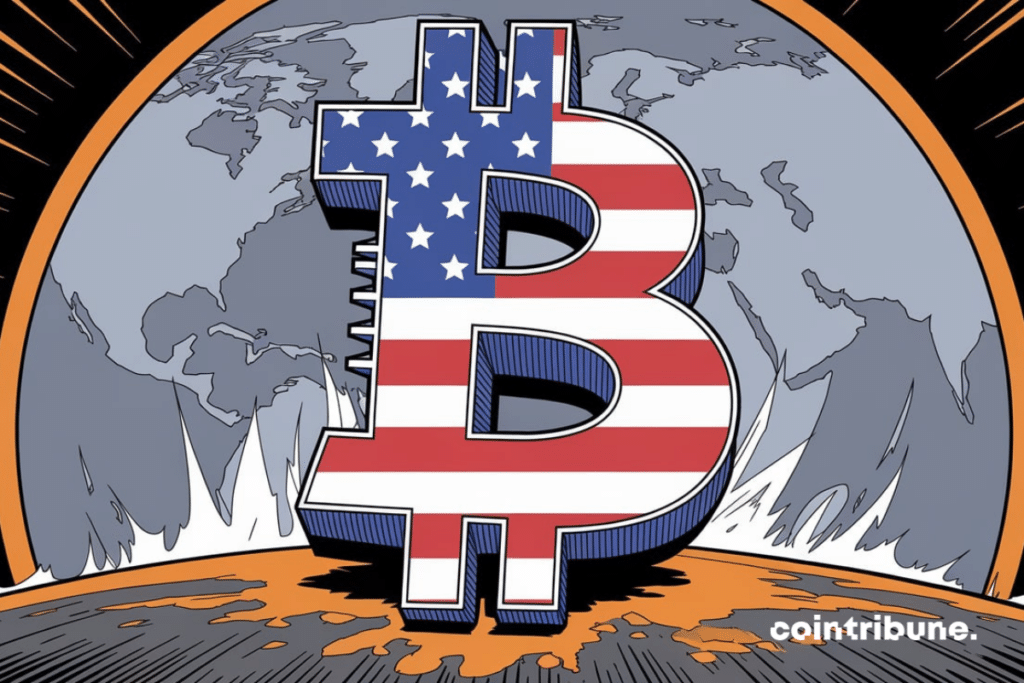CEO Mara Holdings Fred Thiel: "Anybody who's selling #Bitcoin is selling into a market where there's ample demand." pic.twitter.com/0XtkqlctZI
— TFTC (@TFTC21) November 26, 2024
A
A
Bitcoin - American Miners Stand Up To Counter De-dollarization
Fri 29 Nov 2024 ▪
6
min read ▪ by
Getting informed
▪
Investissement
Bitcoin is increasingly perceived across the Atlantic as a strategy to counter global distrust towards the dollar.

Miners Enter the Geopolitical Arena
The recent open letter from the CEO of Marathon (the leading American BTC miner) offers a striking contrast to the obscurantism prevailing in Europe.
This letter arrives in a particular context. The recent election of Donald Trump has brought back his promise to create a strategic reserve of bitcoins to the forefront. Senator Cynthia Lummis proposes in her Bitcoin Act to acquire one million bitcoins over the next five years.
While speculation runs rampant about countries that may be accumulating bitcoins ahead of the United States, Fred Thiel recommends “acting quickly to secure a dominant position”.
His clear description of what makes bitcoin valuable deserves to spread in French media:
“The unique feature of bitcoin is its fixed supply guaranteed by its decentralized monetary policy. Gold is historically regarded as the first reserve of value, but it faces increasing challenges posed by the digital age. It is ineffective for carrying out international transactions. This limitation has gradually undermined gold’s status.
[…]
In contrast, bitcoin shines in its ability to transfer value not only through time but also across space. This asset makes it attractive as a store of value and medium of exchange, especially for nations seeking financial sovereignty. As bitcoin is a rarer and more transferable asset than gold, the United States should take the initiative to accumulate it just as they did with gold.
[…]
The United States already holds just over 200,000 bitcoins, but countries like China, with about 190,000 bitcoins, are not far behind. As more countries recognize the potential of bitcoin as a reserve asset, the United States must take decisive steps to maintain its leadership position.”
Bitcoin to Counter Dollarization
With clarity, the miner confesses that “the world is witnessing a significant trend towards dollarization. Nations are increasingly turning to alternatives to the dollar due to concerns about monetary policy and sanctions.”
Indeed, the BRICS countries no longer hide their ambition to gradually rid themselves of the greenback. Many countries still hesitate out of fear of American retaliation, but this will not last indefinitely.
That said, the BRICS have yet to agree on a new international reserve currency. Yet, bitcoin is reaching out to them. The United States understands this and intends to get ahead. Fred Thiel expresses this in his letter:
“This trend towards dollarization has profound implications. The dollar’s status as an international reserve currency could weaken, hindering the United States’ ability to finance its growing debt while provoking geopolitical instability. Without strategic investment in the bitcoin industry, the United States risks amplifying these challenges and accelerating the loss of confidence in the dollar’s hegemony.”
Regarding these “industrial investments”, let’s quickly recall how the Bitcoin network functions. Transactions are broadcasted in what are called “blocks”. Each of these blocks can contain a fixed number of transactions. Access to these blocks belongs to the miners who control the “hashrate”, that is, the computational power necessary to add new blocks to the “blockchain”.
A country having a significant share of the hashrate on its territory is sovereign in terms of transactions. This country can prioritize certain transactions and prevent adversarial countries from censoring transactions.
An Asset for the Energy Transition
Beyond its geopolitical importance, the CEO of Marathon also highlighted that the bitcoin industry strengthens the energy and technology sectors.
“The bitcoin industry encourages domestic manufacturing of electronic chips as well as energy production. Without investment in domestic production of ASIC chips, the United States will remain dependent on foreign manufacturers [Chinese], thus missing the opportunity to create a robust national supply chain.”
Moreover, miners are a preferred customer for energy producers. They capitalize on surplus electricity produced by renewable and intermittent energy sources.
Rather than selling surplus electricity outside peak hours, energy producers could sell it at a higher price to bitcoin miners. The latter can also step down during demand spikes, helping to stabilize the electrical grid. The State of Texas is already at the forefront in this field, and one wonders what RTE and EDF are waiting for to seriously address the issue.
Even better, the bitcoin industry allows for reducing greenhouse gas emissions. The explanation lies in the fact that oil fields extract oil, but also methane that is often not profitable to transport to civilization.
The consequence is that this gas is burned on site, in flares. Unfortunately, a substantial part of the methane escapes (incomplete combustion due to the wind).
In response to this problem, bitcoin miners can utilize this gas for mining. By doing so, they entirely burn methane into CO2, thus significantly reducing CH4 emissions into the atmosphere.
It is high time the old continent lifts the anathema, or it risks experiencing the greatest monetary earthquake since the end of the Bretton Woods agreements.
Don’t miss our article: “Bitcoin – The Masterstroke of the United States in Geopolitics.”
Maximize your Cointribune experience with our "Read to Earn" program! For every article you read, earn points and access exclusive rewards. Sign up now and start earning benefits.
A
A
Bitcoin, geopolitical, economic and energy journalist.
DISCLAIMER
The views, thoughts, and opinions expressed in this article belong solely to the author, and should not be taken as investment advice. Do your own research before taking any investment decisions.